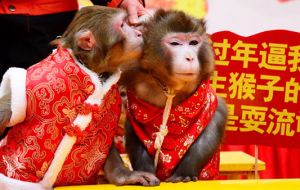MercoPress. South Atlantic News Agency
The Year of the Pig for Chinese couples could mean a third child
 The stamps were issued ahead of the forthcoming Year of the Pig in the Chinese lunar calendar, which begins in February 2019
The stamps were issued ahead of the forthcoming Year of the Pig in the Chinese lunar calendar, which begins in February 2019  One shows a pig running towards a better life and a second shows a five-member pig family living happily
One shows a pig running towards a better life and a second shows a five-member pig family living happily  Two years ago, before the abolition of the one-child policy, stamps for the Year of the Monkey featured two baby monkeys
Two years ago, before the abolition of the one-child policy, stamps for the Year of the Monkey featured two baby monkeys A series of postage stamps featuring two pig parents and three happy piglets has prompted speculation that China may be about to further ease its restrictions on the number of children to deal with its rapidly ageing population.
The stamps were issued this week ahead of the forthcoming Year of the Pig in the Chinese lunar calendar, which begins in February 2019. One shows a pig running towards a better life and a second shows a five-member pig family living happily.
Two years ago, before the abolition of the one-child policy, stamps for the Year of the Monkey featured two baby monkeys. Therefore many Chinese people now believe that restrictions on the number of children may again be lifted to allow three children instead of two.
The one-child policy was introduced in 1979 and is believed to have reduced China’s population by about 400 million over the period. Birth rates had, however, been falling even before the introduction of the one-child policy.
In 1980, the Year of the Monkey stamp featured one monkey baby.
“Can a stamp change the birth policy?” wrote Zheng Yi Ge on the social media Weibo in response to the publication of the stamp.
Sven Shi wrote: “Going by the new stamp design, you can tell China will definitely encourage people to have three kids in 2019,” while Wan Beiying said: “We are no different from the pigs now – we are breeding pigs to breed more babies.”
The ban was abolished finally in 2015 but this has not led to any significant increase in the birth rate, with many people complaining that having a child has become too expensive, because of the rise in the cost of living and education expenses.
The number of births in China rose nearly 8 per cent in 2016 after the shift in policy, but then fell 3.5 per cent in 2017.
China is the world’s most populous nation, with 1.4 billion people, and the country’s remarkable decades of economic expansion were attributed largely to the demographic dividend, where the ratio of those too old or too young to work to the working age population falls below 50%.
China’s demographic dividend peaked in 2010 and the age-dependency ration is set to cross 50% in 2032.
People aged 60 and above make up about 16.2% of China’s population, up from 7.4% in 1950, according to data from the UN Population Division.
The stamps were designed by Han Meilin (82), who also designed the 2008 Beijing Olympic Games mascots “Fuwa” and did zodiac stamps for the Year of the Rooster in 2017.




Top Comments
Disclaimer & comment rulesCommenting for this story is now closed.
If you have a Facebook account, become a fan and comment on our Facebook Page!